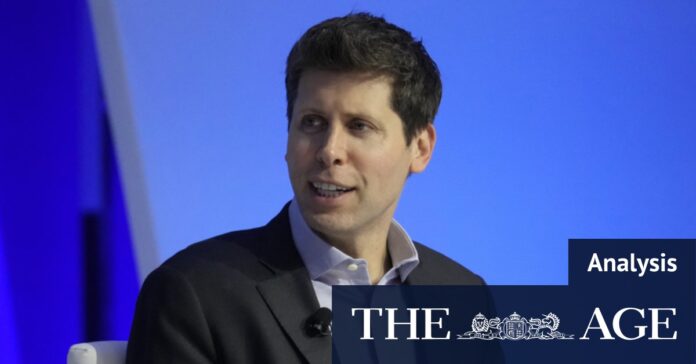[ad_1]
“We can say definitively that the board’s decision was not made in response to malfeasance or anything related to our financial, business, safety or security/privacy practices,” he wrote. “This was a breakdown in communication between Sam and the board.”
There will be plenty of palace intrigue in the coming days, as the full story emerges. But a few things are clear.
First, the ouster was only possible because of OpenAI’s unusual corporate governance structure. OpenAI started in 2015 as a nonprofit and in 2019 created a capped-profit subsidiary — a novel arrangement in which investors’ returns are limited to a certain amount above their initial investment.
But it retained the nonprofit’s mission and it gave the nonprofit’s board the power to govern the activities of the capped-profit entity, including firing the CEO. Unlike some other tech founders, who keep control of their companies via dual-class stock structures, Altman doesn’t directly own any shares in OpenAI.
There are several more quirks about OpenAI’s board. It’s small (six members before Friday, and four without Altman and Brockman) and includes several AI experts who hold no shares in the company. Its directors do not have the responsibility of maximising value for shareholders, as most corporate boards do, but are instead bound to a fiduciary duty to create “safe AGI” — artificial general intelligence — “that is broadly beneficial.”

AI services like ChatGPT have alerted the world to how rapidly “artificial intelligence” technology is evolving.Credit: AP
At least two board members, Tasha McCauley and Helen Toner, have ties to the Effective Altruism movement, a utilitarian-inspired group that has pushed for AI safety research and raised alarms that a powerful AI system could one day lead to human extinction. Another board member, Adam D’Angelo, is CEO of Quora, a question-and-answer website.
Some of Altman’s friends and allies accused these board members of staging a “coup” on Friday. But it’s still not clear which board members voted to oust Altman or what their motivations were.
What we also know about Altman’s ouster is that it has the potential to roil the entire tech industry. Altman was one of the best-connected executives in Silicon Valley, thanks to his years spent running the startup accelerator Y Combinator. His connections allowed OpenAI to forge strong bonds with other tech companies.
Microsoft, in particular, has cast its lot with OpenAI, investing more than $US10 billion ($15.3 billion) in the company and providing much of the technical infrastructure on which products like ChatGPT depend. This month, Microsoft CEO Satya Nadella appeared onstage at a developer conference with Altman, and said it had been “just fantastic partnering with you guys.”
Typically, such close ties would entitle you to a heads-up about a sudden CEO ejection. But Microsoft’s top executives learned about Altman’s firing only a minute — yes, one minute — before the news went out to the public, according to Axios.
On Friday, Nadella reassured customers that the company’s deal with OpenAI remained intact, but it’s clear that the company will want answers about why one of its most important strategic partners removed its top executive so abruptly.
OpenAI’s fate also matters to the thousands of developers who build AI products on top of its language models, and rely on the company to maintain stable infrastructure. Those developers may not flock to a rival overnight, but if more OpenAI employees quit — at least three senior OpenAI researchers announced they were leaving on Friday, according to The Information — they may be tempted to start shopping around.
Lastly, Altman’s defenestration will almost certainly fuel the culture war in the AI industry between those who think AI should be allowed to move faster and those who think it should be slowed down to prevent potentially catastrophic harms.
This argument, sometimes referred to as one between “accelerationists” and “doomers,” has flared up in recent months as regulators have begun to circle the AI industry, and the technology has become more powerful. Some prominent accelerationists have argued that big AI companies are lobbying for rules that could make it harder for small start-ups to compete with them.
They have blamed safety advocates in the industry for inflating AI’s risks in order to entrench themselves.
Loading
Safety advocates, on the other hand, have sounded alarms that OpenAI and other companies are moving too quickly to build powerful AI systems and ignoring voices of caution. And some sceptics have accused these companies of stealing copyrighted works from artists, writers and others to train their models.
Altman was always careful to straddle the line between optimism and worry — making clear that he believed that AI would ultimately be beneficial to humanity, while also agreeing that it needed guardrails and thoughtful design to keep it safe.
Some version of this argument has played out among OpenAI’s staff for years. In 2020, a group of OpenAI employees quit over concerns that the company was becoming too commercial and sidelining safety research in favour of lucrative deals. (They went on to start the rival AI lab Anthropic.) And several current and former OpenAI employees have told me that some staff members believed that Altman and Brockman could be too aggressive when it came to starting new products.
None of this is necessarily related to why Altman was pushed out. But it’s certainly a hint of a battle that’s likely to come.
During our interview Wednesday, Altman said he considered himself something of a centrist in the AI debate.
“I believe that this will be the most important and beneficial technology humanity has ever invented. And I also believe that if we’re not careful about it, it can be quite disastrous, and so we have to navigate it carefully.”
He added, “I think you want the CEO of this company to be somewhere in the middle, which I think I am.”
This article originally appeared in The New York Times.
[ad_2]
Source link


